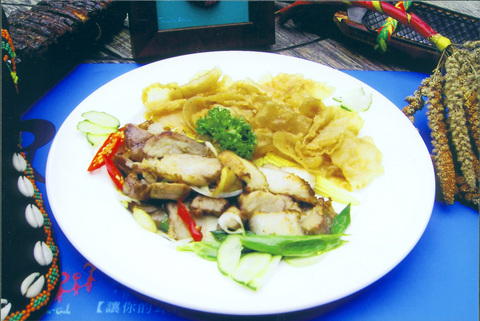Satisfying a vegetarian diet is seldom an issue at restaurants in Taiwan, but being a vegetarian can limit the variety of eating experiences you have here. Veggie alternatives to traditional indigenous dishes might taste delicious but will never be quite the same experience as eating the "real" thing, and this was confirmed on a recent visit to a Gulu Gulu .
A popular spot for authentic indigenous cuisine, Gulu Gulu was opened last year in Taichung city by Paiwan singer Chiu Jin-ming (
Other recommended dishes include Taimali's pig knuckle, which is pickled with spices and millet wine to give it a unique tart and salty flavor, said Chiu's wife, who also works at the restaurant.

PHOTO COURTESY OF GULU GULU
Several of the dishes can be ordered separately for light dining or late-night snacking, but the best way to sample as much as possible is to opt for a set meal, which includes a starter, soup, main course, dessert and beverage.
It isn't often that starters are the main attraction but a slice of ah vai was said to be an exception. Ah-vai is a traditional Paiwan dish prepared with sticky rice, pork and peanuts, and wrapped inside two large leaves, which absorbs some of the oil but retains its flavor. Both the ah-vai and spicy tofu-based dipping sauce it is served with are made by Chiu's mother and shipped weekly from her Taimali village in Taidong.
Every set meal includes a small glass of millet wine, and even if is not your drink of choice, it would be a shame not to try one glass of vava-yoyo or ma pu lao (a stronger version).
The restaurant is a small colonial-style house converted into a two-floor dinning area, which also doubles as a gallery space exhibiting aboriginal art works. Large driftwood sculptures and mural paintings are intermixed with black and white photographs, depicting some of Taiwan's indigenous villages.
On the first floor is a small stage for daily performances at 12:30pm and 7pm. Although the scheduled time is one hour, the music often continues or starts up again later in the evening.
On this particular occasion, Chiu was accompanied by costumers from other tables and took to the stage several times in a two-hour period. The restaurant gets busy during the weekend so reservations are recommended.

Most heroes are remembered for the battles they fought. Taiwan’s Black Bat Squadron is remembered for flying into Chinese airspace 838 times between 1953 and 1967, and for the 148 men whose sacrifice bought the intelligence that kept Taiwan secure. Two-thirds of the squadron died carrying out missions most people wouldn’t learn about for another 40 years. The squadron lost 15 aircraft and 148 crew members over those 14 years, making it the deadliest unit in Taiwan’s military history by casualty rate. They flew at night, often at low altitudes, straight into some of the most heavily defended airspace in Asia.

Beijing’s ironic, abusive tantrums aimed at Japan since Japanese Prime Minister Sanae Takaichi publicly stated that a Taiwan contingency would be an existential crisis for Japan, have revealed for all the world to see that the People’s Republic of China (PRC) lusts after Okinawa. We all owe Takaichi a debt of thanks for getting the PRC to make that public. The PRC and its netizens, taking their cue from the Chinese Communist Party (CCP), are presenting Okinawa by mirroring the claims about Taiwan. Official PRC propaganda organs began to wax lyrical about Okinawa’s “unsettled status” beginning last month. A Global

Taiwan’s democracy is at risk. Be very alarmed. This is not a drill. The current constitutional crisis progressed slowly, then suddenly. Political tensions, partisan hostility and emotions are all running high right when cool heads and calm negotiation are most needed. Oxford defines brinkmanship as: “The art or practice of pursuing a dangerous policy to the limits of safety before stopping, especially in politics.” It says the term comes from a quote from a 1956 Cold War interview with then-American Secretary of State John Foster Dulles, when he said: ‘The ability to get to the verge without getting into the war is

Like much in the world today, theater has experienced major disruptions over the six years since COVID-19. The pandemic, the war in Ukraine and social media have created a new normal of geopolitical and information uncertainty, and the performing arts are not immune to these effects. “Ten years ago people wanted to come to the theater to engage with important issues, but now the Internet allows them to engage with those issues powerfully and immediately,” said Faith Tan, programming director of the Esplanade in Singapore, speaking last week in Japan. “One reaction to unpredictability has been a renewed emphasis on